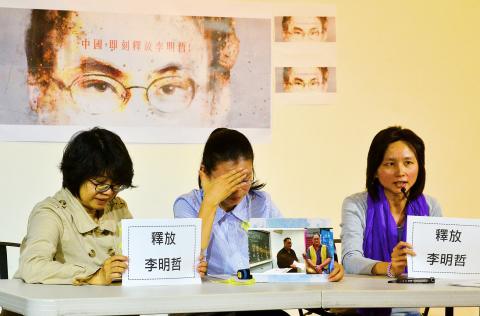The wife of a human rights advocate detained in China plans to depart for Beijing on Monday to seek the release of her husband, who has been held in an unknown location by Chinese authorities for 17 days.
The Chinese government detained rights advocate Lee Ming-che (李明哲) on March 19 over his alleged involvement in activities that “endanger national security.”
Lee’s wife, Lee Ching-yu (李凈瑜), said that she would fly to Beijing to seek her husband’s release herself, without the help of a lawyer.

Photo: Wang Yi-sung, Taipei Times
Lee Ching-yu said she decided to visit Beijing after the meeting between US President Donald Trump and Chinese President Xi Jinping (習近平), which begins tomorrow, to avoid “unnecessary associations and confusion.”
“As much as I want to depart for Beijing immediately, the Trump-Xi meeting could have an effect on regional peace and I do not want my action to stand in the way of a global event,” she said. “I made the decision as a Republic of China citizen. I have to stand with my nation.”
She is to visit China’s Taiwan Affairs Office, the Chinese Supreme People’s Procuratorate and other agencies to understand where and on what charges Lee Ming-che is being held, as well as to deliver his blood pressure medication.
She plans to take the trip independently since the government has offered little assistance since she first announced it on Friday last week.
“I do not believe my nation would abandon its citizens no matter which party is in power. I understand the pressure put on the government because of Taiwan’s special conditions, but neither the Mainland Affairs Council [MAC] nor the Straits Exchange Foundation [SEF] has given me any meaningful information or concrete rescue plans. They could not even help me deliver [Lee’s] medicine,” she said.
The MAC and the SEF should at least have a plan to support her, she said, adding that she would formally visit the two agencies today to seek assistance.
Lee Ching-yu has received conflicting information about her husband’s whereabouts and the possible charges against him, including involvement in the East Turkestan independence movement, acts of terrorism and seeking prostitutes — with penalties ranging from a fine to 15 years in prison — but she could not verify the information without official word from Beijing.
The Chinese government has snubbed Taiwan’s requests for information, she said.
“I have suffered as the families of political victims suffered during the White Terror era. I have been told to succumb to Beijing and not to offend China or pay for the help of influential people,” she said.
She called on China to ensure her right as a family member of a detainee to visit her husband.
Taiwan Human Rights Association secretary-general Chiu E-ling (邱伊翎) called on the government to actively engage in the matter, ensure Lee Ching-yu’s personal safety and facilitate her meetings with Chinese officials.

MAKING WAVES: China’s maritime militia could become a nontraditional threat in war, clogging up shipping lanes to prevent US or Japanese intervention, a report said About 1,900 Chinese ships flying flags of convenience and fishing vessels that participated in China’s military exercises around Taiwan last month and in January have been listed for monitoring, Coast Guard Administration (CGA) Deputy Director-General Hsieh Ching-chin (謝慶欽) said yesterday. Following amendments to the Commercial Port Act (商港法) and the Law of Ships (船舶法) last month, the CGA can designate possible berthing areas or deny ports of call for vessels suspected of loitering around areas where undersea cables can be accessed, Oceans Affairs Council Minister Kuan Bi-ling (管碧玲) said. The list of suspected ships, originally 300, had risen to about 1,900 as

Right-wing political scientist Laura Fernandez on Sunday won Costa Rica’s presidential election by a landslide, after promising to crack down on rising violence linked to the cocaine trade. Fernandez’s nearest rival, economist Alvaro Ramos, conceded defeat as results showed the ruling party far exceeding the threshold of 40 percent needed to avoid a runoff. With 94 percent of polling stations counted, the political heir of outgoing Costa Rican President Rodrigo Chaves had captured 48.3 percent of the vote compared with Ramos’ 33.4 percent, the Supreme Electoral Tribunal said. As soon as the first results were announced, members of Fernandez’s Sovereign People’s Party

Japan’s strategic alliance with the US would collapse if Tokyo were to turn away from a conflict in Taiwan, Japanese Prime Minister Sanae Takaichi said yesterday, but distanced herself from previous comments that suggested a possible military response in such an event. Takaichi expressed her latest views on a nationally broadcast TV program late on Monday, where an opposition party leader criticized her for igniting tensions with China with the earlier remarks. Ties between Japan and China have sunk to the worst level in years after Takaichi said in November that a hypothetical Chinese attack on Taiwan could bring about a Japanese

MORE RESPONSIBILITY: Draftees would be expected to fight alongside professional soldiers, likely requiring the transformation of some training brigades into combat units The armed forces are to start incorporating new conscripts into combined arms brigades this year to enhance combat readiness, the Executive Yuan’s latest policy report said. The new policy would affect Taiwanese men entering the military for their compulsory service, which was extended to one year under reforms by then-president Tsai Ing-wen (蔡英文) in 2022. The conscripts would be trained to operate machine guns, uncrewed aerial vehicles, anti-tank guided missile launchers and Stinger air defense systems, the report said, adding that the basic training would be lengthened to eight weeks. After basic training, conscripts would be sorted into infantry battalions that would take